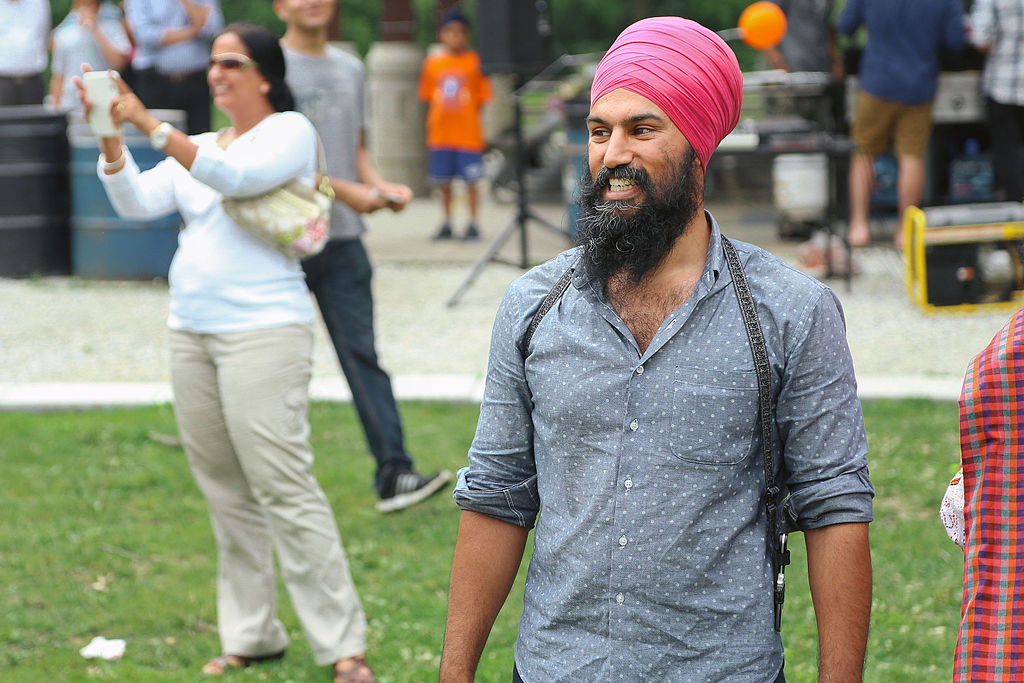Jagmeet Singh has joined the NDP leadership race. His long-anticipated candidacy creates a new dynamic in a contest that runs until the fall.
In a town hall rally, live-streamed on Facebook from Brampton, Ontario, an impressive line-up of provincial New Democrats elected from Ontario, B.C., and Manitoba, along with a former Quebec MP, attested to why Singh, the local Ontario MPP (Member of Provincial Parliament) should lead the federal NDP.
Singh wants Canadians to embrace the NDP as the party of social justice. He champions an inclusive Canada, where everybody has an opportunity to succeed and to live their dreams.
His launch statement highlighted his background fighting injustice and his belief (learned from his mother) “that if we lift up the people around us, we all rise.”
Any excitement generated by the Singh candidacy will benefit NDP leadership debates over issues facing Canada, the place of the party in federal politics, and will draw attention to the ideas of the other leadership candidates.
Singh connects with mainstream media normally indifferent to NDP political life — when they are not outright hostile. The intelligence, charm and photogenic persona of the Ontario MPP mark him out for coverage.
Much of the media interest in Singh comes from measuring his appeal against that of Justin Trudeau. In a charisma versus charisma match Singh holds his own, it turns out.
In the House of Commons, the NDP has been eager to bring Justin Trudeau down to size. For this to advance NDP fortunes, it would help if the Conservative party were to choose a leader few are prepared to vote for.
With the Liberal Party turning out to govern like Conservatives “in a hurry,” those progressives who voted Liberal in 2015 mainly to defeat Stephen Harper will be targets for NDP strategists in preparing for the 2019 election year.
Singh looks like the candidate party insiders want to lead the party and showcase to the country.
Trying to be like the Liberal party or be willing to replace them is a strategy that has produced NDP governments on the Prairies. There are no Liberals to speak of in Manitoba, Saskatchewan, or NDP-governed Alberta.
In recent elections the same thinking has failed in Ontario (where Singh is the deputy leader).
In France, Emmanuel Macron recruited for En Marche, the political movement that propelled him to the presidency, by insisting that potential candidates for office put their country ahead of their party, an approach that rang out loud and clear in a country consumed by partisanship.
NDP partisanship has been a serious problem for the federal party.
In the 2015 election the party adopted the Conservative take on fiscal policy, believing that being deficit-adverse would make their leader prime minister.
The public interest got lost in partisan calculations.
It is a constant challenge for a leader of the NDP to build a party people are excited to support and that voters will see as good choice to win an election.
Trying to make the NDP an instrument of social and economic “progress” can conflict with the aim of winning seats.
While wanting to lead people to the Promised Land the party has its activists out on doorsteps canvassing voters’ concerns.
Undoubtedly, the next leader of the NDP has to speak directly to the challenges facing Canadians in their daily lives. Fear of unemployment and lagging wages are real concerns.
The temptation to appear moderate on economic and social policy is one that NDP leadership candidates Niki Ashton, Guy Caron and Peter Julian have resisted.
In a race that’s about winning over party members looking for serious change, not gathering editorial board support, Jagmeet Singh and Charlie Angus have to show they understand the challenges of an economy where half of the employed population in the Hamilton-Toronto corridor depend on precarious work for their livelihood.
Many NDP party members have Bernie Sanders envy, wanting a candidate who declares: “the economy is rigged, and we need a political revolution to fix it.”
Duncan Cameron is former president of rabble.ca and writes a weekly column on politics and current affairs.




